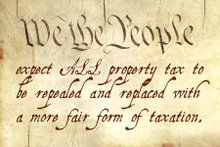I met Senator Brent Waltz at a senate "summer study" on property tax repeal. Senator Waltz helped make a terrific presentation of a plan for repeal. At the end of the meeting, I thanked Senator Waltz for his service. His remark to me in return was beautiful. He eloquently replied, "I serve at your pleasure."
--Melyssa for HFFT
HOWEY: Indiana on the brink of an 80-year crisis
By BRIAN HOWEY
Indiana Columnist
Every 80 years — from the American Revolution, to the Civil War, to the Great Depression — our nation has faced a crisis of epic proportion, with the outcome far from certain at the onset. It is at such a point in history that Indiana stands today, but only few seem to grasp the coming magnitude.
State Sen. Brent Waltz used a point of personal privilege last Thursday to call for an Indiana Executive Committee, or “Ex Com,” that would be headed by Lt. Gov. Becky Skillman and would include three academics, three business people and three from government to develop a crisis plan.
“I view this as a perfect storm of almost mythical proportions,” Waltz, R-Greenwood, told me late Wednesday night after conferring with Senate President Pro Tempore David Long. “The Indiana economy is now at risk more than any other state, save Michigan or California.”
Waltz said that the state’s “three economic pillars” — the auto industry, insurance and agriculture — are extremely vulnerable.
The automotive manufacturing base is in shambles with possibly 140,000 General Motors, Chrysler and related supplier jobs sitting on a tipping point. GM’s sales declined 53 percent last month. Toyota and Honda are also suffering from a huge drop in sales, and Toyota is seeking loans from the Japanese government. There are still 55,000 RV jobs despite the epic downturn that sparked the loss of 2,600 Monaco Coach jobs earlier this week. The state’s financial and insurance industry appears to be teetering as well with news that Conseco is once again in jeopardy. The state’s corn crop has 20 percent targeted for ethanol, now vulnerable to low gas prices.
Last December in a conference hosted by Kokomo Mayor Greg Goodnight and Marion Mayor Wayne Seybold, Robert E. Scott of the Economic Policy Institute said that Indiana would be devastated with even a partial collapse of the Detroit Three automakers. “Indiana would lose between 41,000 and 147,000 jobs,” Scott said. “That is nothing short of catastrophic. It would move Indiana well beyond recession and into depression conditions if there is an auto industry shutdown.”
Kokomo has 22 percent involved in the auto industry, 6.5 percent in Columbus (where Cummins Engine has laid off almost 500 workers in the last few months), 5.5 percent in Anderson, 5.1 percent in Lafayette, 2.6 percent in South Bend/Mishawaka, 2.4 percent in Fort Wayne, 2.2 percent in Terre Haute, 1.5 percent in Indianapolis, and 3.5 percent in Muncie.
Over the last week or so, the “depression” word has entered the lexicon of economists and the media.
Waltz said business at the Statehouse has proceeded at a normal pace. “It’s like we’re on automatic,” Waltz said. “We show up. We pass a bill. We make the sugar cream pie the state pie. We pass a bad budget and hold our nose. But there have been only passing references to what’s happening.”
All that will likely change in dramatic fashion in the next six weeks. With the fates of GM and Chrysler coming by March 31 and potential bankruptcies, and a new state revenue forecast coming in mid-April, the General Assembly will likely find itself on a crisis footing. During the last severe economic downturn — in 1982 — Gov. Robert D. Orr convened a special session that December, which resulted in record tax increases.
During the Civil War, Gov. Oliver P. Morton actually suspended the Legislature and secured loans from Wall Street to finance the war. Depression Gov. Paul McNutt enacted the gross income tax after property tax receipts precipitously declined. McNutt also forged government reforms and consolidations that resulted in $2 million in savings in 1933.
Waltz said that in 2005, Gov. Mitch Daniels gave him a signed copy of President John F. Kennedy’s “Profiles in Courage,” a Pulitzer Prize-winning collection of stories of public officials who made critical decisions while enduring great personal risk.
The Ex Com idea came from President Kennedy’s October 1962 handling of the Cuban Missile Crisis, when he had his brother, Attorney General Robert F. Kennedy, preside over an executive committee to handle the crisis.
Gov. Daniels has been somewhat low-key in the face of the crisis. In December, he downplayed talk by New York Times columnist Paul Krugman that a depression was possible. He acknowledged the economic duress during his inaugural and State of the State addresses in January, likening the current conditions to the change of the seasons, forecasting a warm spring in the offing. When unemployment lines began to grow, Daniels visited WorkOne offices in Fort Wayne, Elkhart and Franklin and began directing additional resources to libraries and churches.
Daniels occupies a unique position among American politicians. As a former White House budget director and now a sitting governor, any dire assessment of the state or U.S. economy could have impacted the markets.
But Sen. Waltz believes Indiana stands on the brink. Of the crises that have hit the United States every 80 years, he noted that when Valley Forge, Bull Run and Pearl Harbor occurred, “there was no foregone conclusion we wouldn’t fail.” He noted that ultimately the American spirit prevailed, creating 13 independent states, the Civil War forged a true nation and ended slavery, and the Great Depression and World War II built a social safety net and a global super power.
“America always reinvented itself through these reorderings,” Waltz said.
Sunday, March 8, 2009
HOWEY ON SENATOR WALTZ: Indiana on the brink of an 80-year crisis
Posted by
M Theory
at
Sunday, March 08, 2009
![]()
Subscribe to:
Post Comments
(Atom)




No comments:
Post a Comment